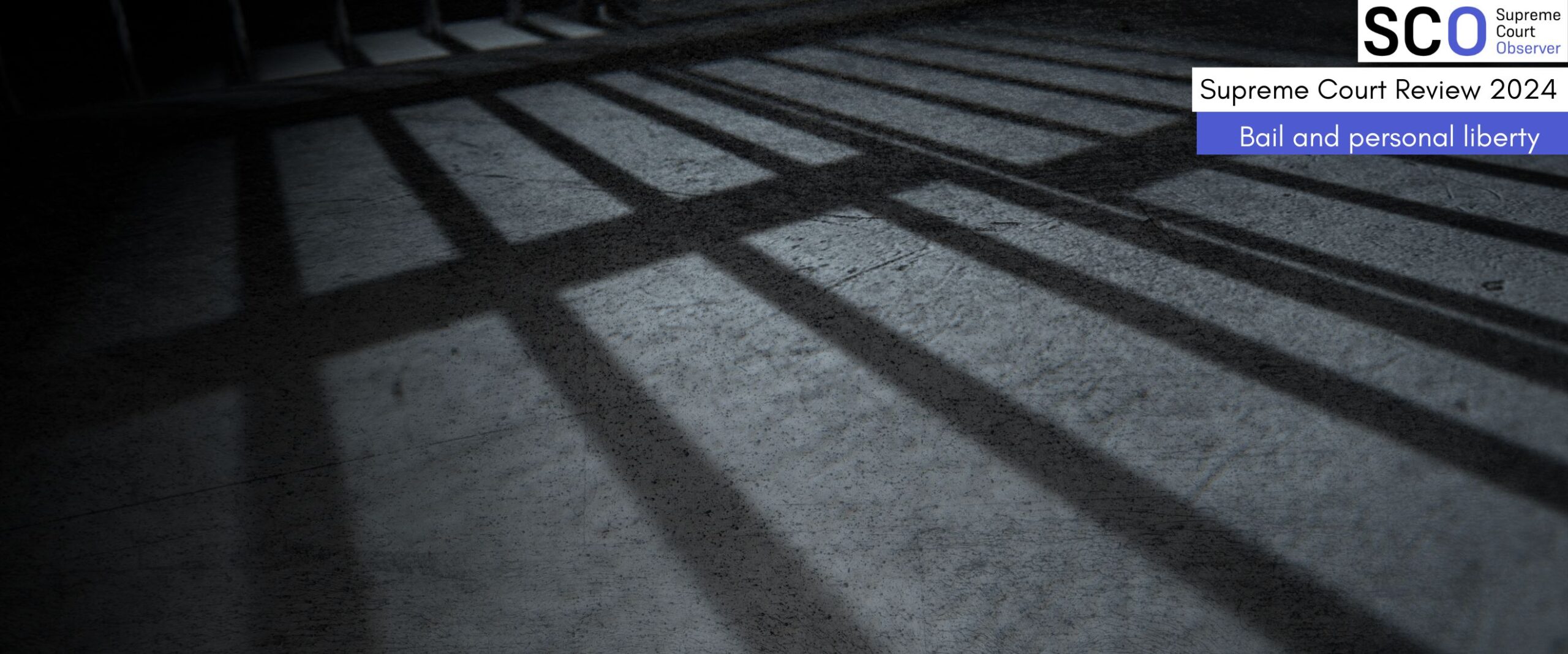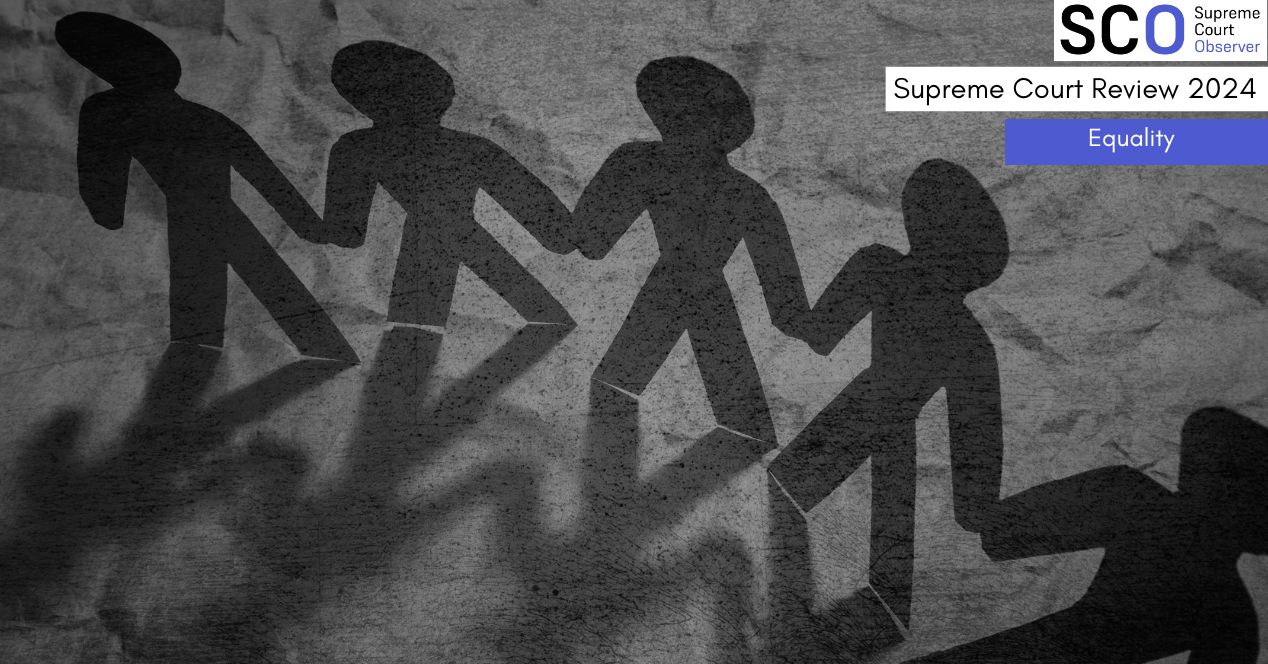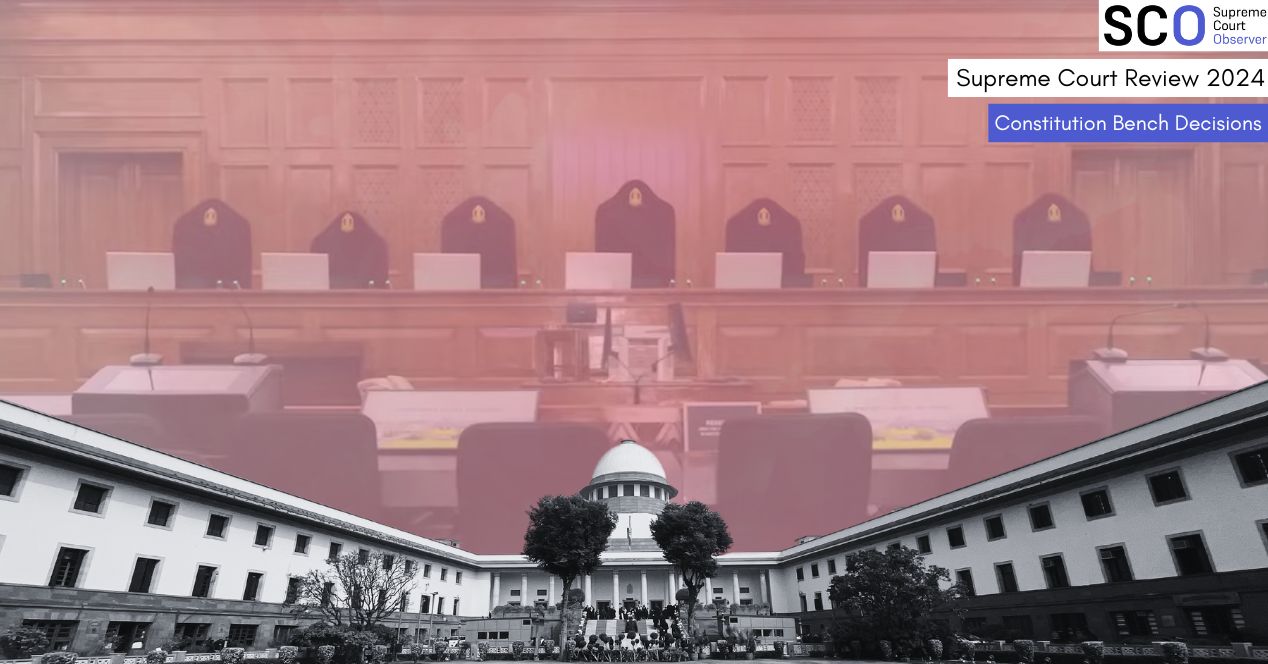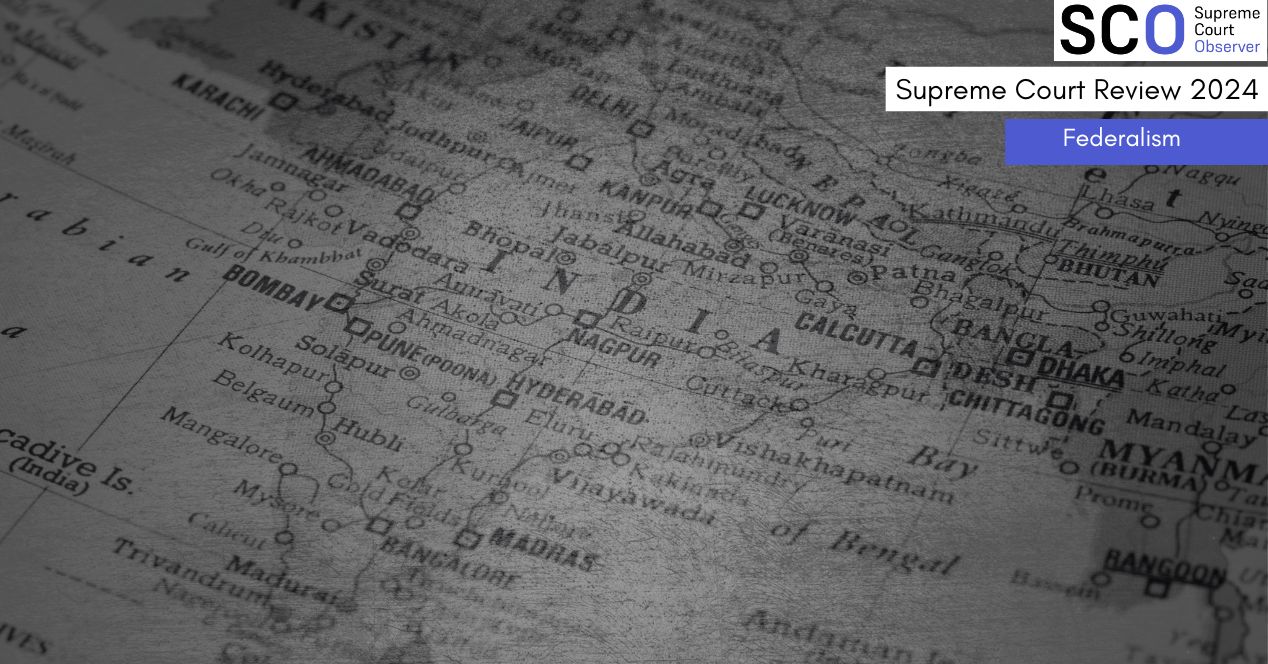Analysis
Supreme Court Review 2024: Batting for bail in the face of delayed trials
The Court noted the prolonged incarceration without trial of political leaders and activists arrested under special criminal statutes

Last year marked a noticeable shift in the Supreme Court’s approach to bail when it came to special criminal legislations like the Prevention of Money Laundering Act, 2002 (PMLA) and the Unlawful Activities (Prevention) Act, 1967 (UAPA). The Court increasingly leaned on the principle of personal liberty under Article 21, balancing it against the rigid statutory conditions for bail.
Under the PMLA, Section 45 imposes twin conditions for bail: the accused must prove they are not prima facie guilty and assure the Court they will not commit a crime. These conditions, upheld by a three-judge bench in Vijay Madanlal v Union of India (2022), continued to hold the field. Yet, 2024 saw the Supreme Court soften its stance in several high-profile cases, where it relied on prolonged incarceration and the long road to trial as a factor for granting bail.
In the Bhima Koregaon case, two UAPA-accused were granted bail on the ground of delays in trial and insufficient prima facie evidence. Yet, 2024 was also the year when activist Umar Khalid’s much-anticipated bail petition took an unexpected turn. Despite being listed (but barely heard) throughout 2023, Khalid withdrew his plea early in 2024.
From top politicians to activists, the thread running through these cases was an acknowledgment of the human cost of extended pre-trial detention.
Three is a crowd: Arvind Kejriwal’s bail saga
In 2024, the Supreme Court granted bail to former Delhi Chief Minister Arvind Kejriwal on three separate occasions following his arrest by the Enforcement Directorate (ED) and the Central Bureau of Investigation (CBI) in connection with the Delhi Liquor Policy scam.
The first instance was in May, a couple of days before the third phase of voting in the General Elections. A bench of Justices Sanjiv Khanna and Dipankar Datta granted Kejriwal three weeks of bail. This allowed him to campaign for the Aam Aadmi Party (AAP) in the run-up to polling day in Delhi. Kejriwal surrendered himself back into custody in June.
In July, Kejriwal was granted bail for the second time. By this point, he had spent over 90 days in custody. The Court observed that his prolonged incarceration violated his personal liberty under Article 21 of the Constitution. The bench directed Kejriwal to be released on interim bail stating that the “right to life and liberty is sacrosanct”
Kejriwal had challenged the legality of his arrest on the ground that following conditions under the PMLA had not been satisfied:
- The arrest must be based on material evidence in possession of the ED.
- There must be a reason to believe, recorded in writing, that the accused is guilty of the offence.
- The grounds for arrest must be clearly communicated to the accused.
While the bench found that the “reasons to believe” condition was satisfied, it noted that the “need and necessity” of the arrest should also be a factor in determining its legality. This issue was referred to a larger bench. Noting that Kejriwal was still the Chief Minister of Delhi, the bench imposed conditions that did not permit him to enter the office of the Chief Minister or sign any official documents.
Shortly before securing bail in the ED case, Kejriwal was arrested by the CBI, a move that his counsel, Senior Advocate A.M. Singhvi, described as an “insurance arrest” to keep him in prison. His CBI arrest came immediately after a trial court had granted him bail in the ED case.
In September, Kejriwal challenged this arrest before the Supreme Court. A bench comprising Justices Surya Kant and Ujjal Bhuyan granted him interim bail, but the judges were divided on the legality of the CBI’s arrest, and referred the matter to a three-judge bench. Justice Kant upheld the arrest, while Justice Bhuyan disagreed and questioned its timing and intent. Justice Bhuyan noted that the CBI had been investigating Kejriwal and the Delhi Liquor Policy scam for over a year but only deemed it necessary to arrest him when he was on the verge of release in the ED case. The effect of all these developments is that the legality of Kejriwal’s arrest in both the CBI and ED cases are now pending in the Supreme Court.
The Soren saga
On the face of it, Hemant Soren’s case had many similarities with Kejriwal: the Chief Minister of an Opposition-ruled state in the dock for alleged money laundering in a scam. Unlike Kejriwal, Jharkhand CM Soren resigned from his post before his arrest. His case came up before a Vacation Bench of Justices Datta and S.C. Sharma, shortly after Kejriwal was granted bail to campaign for elections.
However, Soren was not as fortunate. While denying the bail plea, Justice Datta pointed to a cognisance order by a Special Court where Soren had sought bail, noting that he was effectively pursuing the same relief in two courts. Considering this as approaching the Court “without clean hands”, the bench dismissed his plea as withdrawn. This prompted Soren to turn to the Jharkhand High Court where he successfully secured bail. On appeal, the Supreme Court endorsed the High Court’s judgement describing it as “well-reasoned”.
Soren resumed his duties as Chief Minister following release. Kejriwal, on the other hand, had resigned from his post after his release in September.
A lengthy game of snakes and ladders
Manish Sisodia, who was deputy chief minister of Delhi, had also been arrested by the ED and CBI in the Delhi Liquor Policy scam. The Supreme Court had rejected his bail plea in 2023, while noting it would reconsider it if his trial failed to commence promptly. In August 2024, a bench of Justices B.R. Gavai and K.V. Viswanathan granted Sisodia bail while referring to his prolonged 17-month incarceration without trial.
This was Sisodia’s third bail plea in the top court. His earlier attempt, in June 2024, was dismissed after the ED assured the Court that the trial would begin soon. In the proceedings that led to his release, the Court dismissed the ED’s argument that Sisodia should approach the trial court, likening the process to a game of “snake and ladder.” The bench noted that a timely trial was improbable considering the extensive evidence and large number of witnesses to be examined.
Sisodia aids Soren’s aide Prem Prakash
Shortly after Sisodia’s bail, the Supreme Court granted bail to Prem Prakash, an aide of Jharkhand Chief Minister Hemant Soren. The bench relied on Sisodia’s case as precedent. The bench of Justices Gavai and Viswanathan reiterated that the principle “bail is the rule, jail is the exception,” is applicable even in money laundering cases under the PMLA. Here again, we notice a shift from the more rigid prescription in Vijay Madanlal.
‘Prolonged incarceration should not be punishment without trial’
Bharat Rashtra Samithi leader K. Kavitha, also arrested in connection with the Delhi Liquor Policy scam, was granted bail in August 2024. The bench of Justices Gavai and Viswanathan not only approved her bail but also raised questions about the prosecution’s approach during the hearings. The Court highlighted a concerning pattern where individuals accused in the Delhi Liquor Scam case became approvers or witnesses.
Senior Advocate A.M. Singhvi had previously flagged this issue while defending Arvind Kejriwal before a bench of Justices Khanna and Datta, alleging that some accused secured bail soon after implicating Kejriwal.
While granting Kavitha’s bail, the Court noted that both the ED and CBI had already filed chargesheets, eliminating the need for her continued custody. Referring to the Sisodia precedent, the bench observed that “prolonged incarceration before being pronounced guilty of an offence should not be permitted to become punishment without trial.”
Balaji is bailed out
Senthil Balaji, a leader of the Dravid Munnetra Kazhagam, secured bail in September 2024 after spending 15 months in custody without a clear timeline for trial. Balaji was arrested for his alleged role in a cash-for-jobs scam when he was transport minister. A bench of Justices A.S. Oka and A.G. Masih granted the bail, citing the Supreme Court’s 2021 ruling in Union of India v K.A. Najeeb. Najeeb observed that stringent bail provisions “melt down” when trials are unlikely to conclude within a reasonable timeframe. Sisodia’s case was also cited favourably by the bench.
Just three days after his release, he rejoined the Tamil Nadu Cabinet. An intervenor subsequently approached the Supreme Court, arguing that Balaji’s return to the cabinet as a minister could intimidate witnesses and prevent them from testifying in his case. Justice Oka remarked on the haste with which Balaji resumed his political duties. The developments in the Balaji case have added a layer of complexity to cases where the Court has granted bail to political leaders.
Khalid tries his luck in the trial court
On 14 February 2024, activist Umar Khalid withdrew his bail petition from the Supreme Court, over three years after being imprisoned under the UAPA for his alleged involvement in the 2020 Delhi riots. Khalid’s withdrawal followed repeated delays in his case, as his bail petition was listed multiple times but was never heard substantially due to various reasons like unavailability of counsel, judge’ recusals, or scheduling conflicts with Constitution Bench matters.
In January and February 2024, the case was listed six times but postponed each time due to time constraints and clashing schedules. In the last hearing, Khalid chose to withdraw his petition—he cited a “change in circumstance” but did not go into details.
Some more relief for the BK-16
Last year also saw some developments in the Bhima Koregaon case, where academics, activists and writers were arrested under the UAPA for their alleged links to Maoists. In April 2024, the Supreme Court granted bail to Shoma Sen, a former professor of English Literature at Nagpur University. The judgement, authored by Justice Aniruddha Bose, acknowledged that pre-trial detention is legally permissible in specific circumstances, such as preventing further offences. Any deprivation of liberty must be reasonable and justified, he observed. The Court noted the prolonged delay in framing charges and the significant period Sen had already spent in incarceration. It further observed that the evidence on record did not prima facie establish her involvement in the activities of the Communist Party of India (Maoist), a banned organisation. Her release came almost a year after co-accused Vernon Gonsalves and Arun Ferreira were granted bail by the Supreme Court.
In May 2024, Prof. Hany Babu withdrew his bail petition from the Supreme Court. A bench led by Justice Bela Trivedi allowed the withdrawal, as Babu cited “a change in circumstances” and reportedly planned to approach the Bombay High Court, seeking parity with his co-accused who had already secured bail.
Later that month, journalist and activist Gautam Navlakha was also granted bail by the Supreme Court. Navlakha had been under house arrest since November 2022 due to health concerns. The bench of Justices M.M. Sundresh and S.V. Bhatti noted that he had already spent over four years in custody with the trial far from completion. Additionally, the Court took into account that six co-accused in the case had been released on bail.




